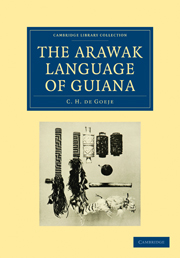Book contents
- Frontmatter
- Preface
- Contents
- List of literature
- Rules for pronunciation and abbreviations
- Alphabetical Index
- German words in Schultz' texts
- CHAPTER I Finite verb
- CHAPTER II Character of the Arawak words
- CHAPTER III Infinite verb
- CHAPTER IV Auxiliary verb a
- CHAPTER V Intensives, conjunctions, etc.
- CHAPTER VI K; B
- CHAPTER VII F; P; B
- CHAPTER VIII M
- CHAPTER IX N
- CHAPTER X D
- CHAPTER XI T
- CHAPTER XII Formation of verbs, etc.
- CHAPTER XIII L; R
- CHAPTER XIV H
- CHAPTER XV S
- CHAPTER XVI Vowels, diphotongs; colours
- CHAPTER XVII Classes of utterances; numerals
- CHAPTER XVIII Man
- CHAPTER XIX Foreign words. Arawak and Arawak-Maipure
- CHAPTER XX Origins of the Arawak language
- APPENDIX: Information collected in Surinam in 1907 and in 1928
CHAPTER I - Finite verb
Published online by Cambridge University Press: 05 October 2010
- Frontmatter
- Preface
- Contents
- List of literature
- Rules for pronunciation and abbreviations
- Alphabetical Index
- German words in Schultz' texts
- CHAPTER I Finite verb
- CHAPTER II Character of the Arawak words
- CHAPTER III Infinite verb
- CHAPTER IV Auxiliary verb a
- CHAPTER V Intensives, conjunctions, etc.
- CHAPTER VI K; B
- CHAPTER VII F; P; B
- CHAPTER VIII M
- CHAPTER IX N
- CHAPTER X D
- CHAPTER XI T
- CHAPTER XII Formation of verbs, etc.
- CHAPTER XIII L; R
- CHAPTER XIV H
- CHAPTER XV S
- CHAPTER XVI Vowels, diphotongs; colours
- CHAPTER XVII Classes of utterances; numerals
- CHAPTER XVIII Man
- CHAPTER XIX Foreign words. Arawak and Arawak-Maipure
- CHAPTER XX Origins of the Arawak language
- APPENDIX: Information collected in Surinam in 1907 and in 1928
Summary
Let us consider the following sentence:
H-adeka, d-imigoda hu sikapo wolf o-koboroko jin: ki-o-doma ka-ye-see I-send you sheep wolf among as this!-because affirmed-koborokwa-li hu hori jin, ma-wakaia-li bajia hu wiru jin. To-moroa wisdom-freely ye serpent as, withheld-evil-freely also ye dove as its-but h-aitoa-li loko-no o-mun. Behold, I send you forth as sheep in the ye-beware-freely man-plural at midst of wolves: be ye therefore wise as serpents, and harmless as doves. But beware of men.
The action-words h-adeka and d-imigoda are composed of a pronominal prefix (h-, d-), a quality-word (quality, state or condition) or object-word (ade, strong appearance, imigo, readiness, being ready), a consonant which indicates in what way the preceding compound acts (k making its appearance in a positive manner, d to be firmly established, to stand, to be stiff) and a vowel indicating the general character of what is happening.
The words we here call action-words, are all composed in this way; they all indicate an activity, and moreover a person can be indicated who causes this activity or controls it, which person in the finite forms is indicated by a pronominal prefix, or by an emphasizing pronoun or object-word, which fulfills the same function and occupies the same place as the pronominal prefix.
It is almost certain, that, for instance lo-oda, he died, and h-adunka, sleep ye, also belong to this category; a-odo, S.a-hudu-, means: permanently firmly established, or firmly established in space (which may refer to the body or to the soul); adunku-may have a similar meaning, or it may mean “to snore”.
- Type
- Chapter
- Information
- The Arawak Language of Guiana , pp. 48 - 56Publisher: Cambridge University PressPrint publication year: 2009First published in: 1928



